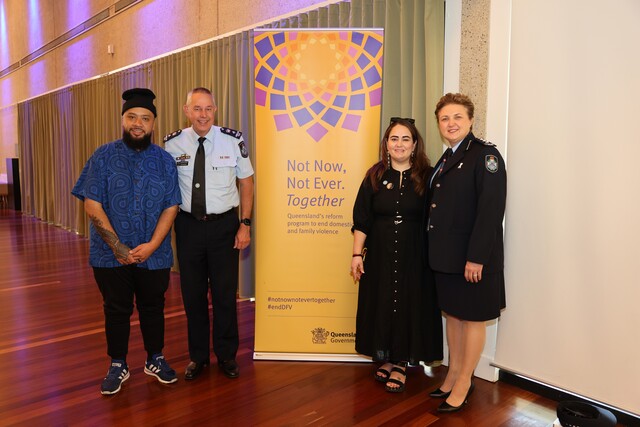Inspector Melissa Dwyer of the State Domestic Family Violence and Vulnerable Persons Unit was initially drawn to the police service based on a strong sense of social justice she had always had, even as a child.
Inspector Dwyer said she remembers supporting her friends from being bullied which was more important to her, even if it meant putting herself in harm’s way.
“I always wanted a job that was challenging, where it differed from one day to the next,” she said.
“It was like our old recruitment strategy says ‘We don’t do boring!’ and I knew the QPS would be exactly that, and they haven’t disappointed.
“I have seen the best and worst of humanity, and I refuse to accept to live in a world where human beings can treat each other in a way that has no regard to their life or safety.
“Ensuring women and their children are safe and can live and grow in healthy and respectful homes drives me each day to do more, be more and achieve more.
“Ensuring victim-survivor safety and holding perpetrators to account is a challenge and probably the biggest challenge in my 33 years of policing, but one I pursue with determination every day.”
The Queensland Police Service continues to develop training for its officers in regards to domestic and family violence, covering areas that can sometimes be difficult to pinpoint such as coercive control.
It began with online training in coercive control which was released on 31 January 2022 and was endorsed by Australia’s National Research Organisation for Women’s Safety (ANROWS) and the Queensland Domestic Family Violence Death Review and Advisory Unit (DFVDRAU) and enhances members recognition of, response to, and investigation of coercive control within a DFV context, including accurately identifying the person most in need of protection.
The development of this training identified the QPS were on the front foot – the first in the nation to be developing and delivering training many years before the coercive control legislation was introduced.
The training provides an understanding of coercive control, the importance to view DFV incidents as part of a broader pattern of behaviour designed to establish and maintain power and control over a victim-survivor, an understanding of the cumulative impacts of coercive control on adult and child victims, how this may impact decision-making behaviour, knowledge of perpetrator tactics and behaviours used to establish and maintain power and control over victim-survivors and children, an understanding of how to identify and investigate coercive control within the current legislative framework.
Face to face coercive control training is due to commence in 2024 and is to be delivered to sworn and unsworn members in preparation for the commencement of the coercive control criminal offence on 26 May 2025.
Inspector Dwyer said she had been fortunate to work in specialised units that have challenged her and supported professional growth and development.
“These opportunities have included being a female regional detective often responsible for the investigating rape offences including those perpetrated in marriage, and sexual assault and domestic violence homicides.
“These opportunities provided the knowledge and skills to support the position I now hold to develop strategic policing activities and responses to domestic and family violence.
“In 2023 I was supported by the Commissioner of Police and the Police Minister to attend an international domestic violence conference in Chicago to gain insights into policing and multi-agency responses in domestic and family violence.
“This provided an invaluable opportunity to identify approaches and learnings and, where appropriate, include those in a Queensland perspective to enhance our response to domestic and family violence.
“Engagement with victim-survivors and secondary victims is crucial to ensure the policing response is contemporary ensuring our engagement practices are victim-centric and trauma informed. Understanding systemic barriers from a victim-survivors perspective is essential to ensure victim-survivors safety are safety and feel safe, perpetrators are held to account and children can grow and develop in safe homes.
“I refuse to accept that we cannot be better, do better and end domestic and family violence to ensure people and children live free of domestic violence.
“It is a fundamental human right. It is not lost on me that the approach to end domestic violence requires all parts of the system and the community working together to raise awareness, knowledge and understanding of the drivers of domestic violence in order to end domestic violence in one generation.”
Year on year reports of domestic and family violence continue to increase.
In the 23/24 approximately 192,000 DFV occurrences were recorded by police.
That equates to more than 520 domestic and family violence occurrences attended to by Police every day across Queensland.
Domestic and family violence continues to be a priority for the Queensland Police Service, with significant investment made to support an integrated response to the largest call for service.
“It would also be easy to be overwhelmed by the quantum of calls, but conversely it gives me strength that victim-survivors, bystanders and family members contact police to seek assistance and support.
“The attention being provided to domestic and family violence by all levels of government, and the commitment to eradicating this scourge in our society continues to drive me personally towards being better, doing better and achieving more.
“I truly believe that together, as a united and collective front we can eradicate domestic and family violence from our communities.
“The hardest part is ensuring we continue to develop strategies that have meaningful and sustainable outcomes for victim-survivors, their children and perpetrators.
“This is underpinned by contemporary research and knowledge to support the development of appropriate legislation, policies and practices for frontline police who respond to domestic and family violence at all times of the day and night, often at times when other government departments are not working.
“Together, our partner agencies are working with us to support a more integrated response and service delivery to victim-survivors and perpetrators, but there is still much to be done to ensure that all agencies can respond to victim-survivors and perpetrators when domestic and family violence occurs, not just the QPS who are predominately the only after-hours service doing primary response work.”









